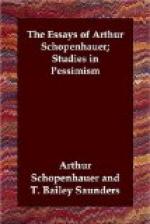And above and beyond all this, there is a separate and peculiar source of pleasure, and consequently of pain, which man has established for himself, also as the result of using his powers of reflection; and this occupies him out of all proportion to its value, nay, almost more than all his other interests put together—I mean ambition and the feeling of honor and shame; in plain words, what he thinks about the opinion other people have of him. Taking a thousand forms, often very strange ones, this becomes the goal of almost all the efforts he makes that are not rooted in physical pleasure or pain. It is true that besides the sources of pleasure which he has in common with the brute, man has the pleasures of the mind as well. These admit of many gradations, from the most innocent trifling or the merest talk up to the highest intellectual achievements; but there is the accompanying boredom to be set against them on the side of suffering. Boredom is a form of suffering unknown to brutes, at any rate in their natural state; it is only the very cleverest of them who show faint traces of it when they are domesticated; whereas in the case of man it has become a downright scourge. The crowd of miserable wretches whose one aim in life is to fill their purses but never to put anything into their heads, offers a singular instance of this torment of boredom. Their wealth becomes a punishment by delivering them up to misery of having nothing to do; for, to escape it, they will rush about in all directions, traveling here, there and everywhere. No sooner do they arrive in a place than they are anxious to know what amusements it affords; just as though they were beggars asking where they could receive a dole! Of a truth, need and boredom are the two poles of human life. Finally, I may mention that as regards the sexual relation, a man is committed to a peculiar arrangement which drives him obstinately to choose one person. This feeling grows, now and then, into a more or less passionate love,[1] which is the source of little pleasure and much suffering.
[Footnote 1: I have treated this subject at length in a special chapter of the second volume of my chief work.]
It is, however, a wonderful thing that the mere addition of thought should serve to raise such a vast and lofty structure of human happiness and misery; resting, too, on the same narrow basis of joy and sorrow as man holds in common with the brute, and exposing him to such violent emotions, to so many storms of passion, so much convulsion of feeling, that what he has suffered stands written and may be read in the lines on his face. And yet, when all is told, he has been struggling ultimately for the very same things as the brute has attained, and with an incomparably smaller expenditure of passion and pain.




